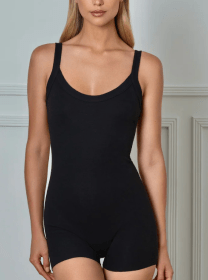Sustainable fashion is quickly becoming a buzzword in the fashion industry. But what does it actually mean? And, more importantly, why should you care? Sustainable fashion is much more than just a trendy new term. It’s about creating a better future for our planet and its people.
Fast fashion involves low wages, unethical working conditions, and an immense amount of waste that fill our landfills. At Gooseberry, we are committed to fashion sustainability and seek to educate prospects on the importance of investing in ethical fashion. We not only pay our employee's artisans fairly, but we have planted over 131,000 trees to help combat climate change!
The Reality of Fast Fashion: Sweatshops & Fill Landfills
The harsh reality of fast fashion is something that the industry is all too familiar with. Unfortunately, in many cases, fashion is produced in unethical conditions through a system of labor exploitation and environmental degradation. Sweatshops are a common element of the garment industry. This includes low wages and long hours imposed on workers, while landfills overflow with textiles discarded by consumers.
This type of fashion production has an immense impact on our planet. According to the Environmental Protection Agency (EPA), clothing and textiles make up 5% of all landfill waste and are the third most-generated form of waste in the United States. In addition to creating piles of unusable material, fashion production requires extensive amounts of water, energy, and chemicals for dyeing and finishing fabrics. This puts a strain on natural resources and contributes to global climate change.
Additionally, this system of labor exploitation is highly unethical. Many garment workers experience low wages and long hours, often with inadequate safety conditions. In response, many have taken to protests and marches in demand of better pay and working conditions.
It is clear that current practices of fast fashion are unsustainable, unethical, and damaging to both people and the planet. This highlights the importance of fashion sustainability – an approach that is ethical, sustainable and respects human rights.
The Ethics of Sustainable Fashion
With more and more people becoming conscious of their fashion choices, sustainable fashion is the way of the future. Sustainable fashion prioritizes ethical production methods, environmentally friendly processes, and mindful consumption. It also has the potential to help reduce global warming and improve working conditions in garment factories.
When it comes to ethical fashion, the traditional approach often includes using materials that are produced or sourced locally, using natural dyes and avoiding hazardous chemicals, supporting artisans and workers who are paid fair wages, reducing water consumption and energy usage, and avoiding animal cruelty in the production process. In contrast, fast fashion contributes to issues such as air pollution, exploitation of workers, unethical production practices, and waste generation.
According to the World Economic Forum, “With more than 60 million people employed in the textile and garment industries, a human rights crisis is looming unless significant efforts are made to shift the industry towards improved labor standards." For this reason, we must strive for sustainability in our fashion choices and support brands that prioritize ethical production methods.

The Quality of Sustainable Fashion
Sustainable fashion, also known as ethical fashion, is a movement that seeks to make the fashion industry more socially responsible and environmentally friendly. It focuses on the production of clothing and accessories that are made from organic and recycled materials, minimizing the environmental impacts associated with traditional manufacturing processes. By reducing waste, conserving resources, and minimizing pollution, sustainable fashion can help to improve the overall health of the planet.
But sustainable fashion isn’t just better for the planet and people—it’s also of a higher quality than fast fashion. Sustainable fashion sustainability is rooted in a commitment to craftsmanship and quality materials, unlike many fast fashion brands that are driven by trends and disposable clothing. Sustainable fashion pieces often feature beautiful details like embroidery, intricate stitching, high-quality fabrics, and unique silhouettes. These items are designed to last longer, thereby making them a better investment over time.
As the world becomes increasingly aware of the impacts of fast fashion, more people are turning to sustainable fashion as an alternative. By supporting sustainable fashion companies and purchasing products made from natural or recycled materials, you can make a powerful statement about your commitment to fashion sustainability.
At Gooseberry, we’re committed to fashion sustainability and providing our customers with quality, sustainable fashion pieces that they can wear for years to come. We work with artisans to create stunning clothing and accessories, while also promoting ethical labor practices, providing safe working conditions, and paying fair wages. Plus, since 2011, Gooseberry has planted over 131,000 trees in areas that have been severely affected by deforestation.
So when you choose to shop with Gooseberry, you can be sure that you’re not only buying quality fashion pieces but also supporting sustainable fashion initiatives that have a positive impact on people and the planet.
The Impact of Sustainable Fashion
Sustainable fashion is the wave of the future. It is becoming increasingly important to consider the impact our fashion choices have on the environment, both now and in the future. Sustainable fashion helps ensure that people, animals, and our planet are protected from harm.
Sustainable fashion is an eco-friendly solution that can help reduce the environmental footprint of the fashion industry. By using more sustainable materials and production methods, we can minimize waste, conserve energy and resources, and ultimately reduce pollution. Sustainable fashion also provides better working conditions for workers involved in its production process.
Not only is sustainable fashion more eco-friendly, but it also creates positive impacts socially. It helps to create jobs in local communities and supports the livelihoods of the artisans who create these beautiful pieces. Additionally, it helps to create positive social change by providing improved working conditions, better wages, and more respect for the environment and those employed within it.
Overall, sustainable fashion is a much more ethical and responsible option than fast fashion. It reduces our carbon footprint, supports local artisans, and creates a better future for our planet and its inhabitants. In short, it is the solution for a more sustainable future.

Gooseberry's Commitment to Sustainability
At Gooseberry, we strongly believe that fashion sustainability is not only important for our planet, but also for the people who work hard to make clothes. Our commitment to the environment includes using sustainable fabrics, upcycling existing materials into new collections, paying our artisans' fair wages, and offering them better working conditions than those found in typical sweatshops. Our pieces are almost all made-to-order, to avoid overstock which can lead to waste. We are also dedicated to planting trees to combat the emissions caused by package delivery. Each order will help plant a certain number of trees based on the weight of the package and the mode of transportation for the delivery. Using this formula, we have planted over 131,000 trees to help offset these emissions.
By choosing sustainable fashion, you can have a positive impact on the world around you. Every time you buy from a sustainable brand like Gooseberry, you are taking a stand against fast fashion and helping create a more ethical fashion industry.
Sources:
- EPA. National Overview: Facts and Figures on Materials, Wastes and Recycling. https://www.epa.gov/facts-and-figures-about-materials-waste-and-recycling/national-overview-facts-and-figures-materials
- World Economic Forum. Suits you - and the planet: Why fashion needs a sustainability revolution. https://www.weforum.org/agenda/2021/09/fashion-sustainability-revolution-sdis21/













